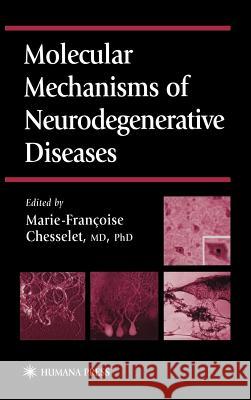Molecular Mechanisms of Neurodegenerative Diseases » książka
Molecular Mechanisms of Neurodegenerative Diseases
ISBN-13: 9780896038042 / Angielski / Twarda / 2000 / 410 str.
The field ofneurodegenerative diseases is undergoing an unprecedented revolution. The past decade has seen the identification of new mutation mecha- nisms, such as triplet repeat expansions, and new genes causing familial forms of common neurodegenerative diseases, such as Parkinson's and Alzheimer's diseases. Cellular and animal models based on this genetic information are now available and, importantly, common mechanisms are rapidly emerging among diseases that were once considered unrelated. The field is poised for the development of new therapies based on high throughput screenings and a bet- ter understanding of the molecular and cellular mechanisms leading to neurodegeneration. Molecular Mechanisms of Neurodegenerative Diseases reviews recent progress in this exploding field. By nature, such a book cannot be all inclu- sive. It focuses on Alzheimer's, Parkinson's, and CAG triplet repeat diseases. In the first chapter, Bill Klein reviews the role of A toxicity in the patho- physiology of Alzheimer's disease. This controversial issue is further exam- ined in the context of transgenic models of Alzheimer's disease by LaFerla and colleagues. Sue Griffin and Robert Mrak, and Caleb Finch and collabora- tors, then examine the role of glial cells and inflammation in Alzheimer's disease; a review of the role of proteolysis in the generation of abnormal pro- tein fragments by Hook and Mende-Mueller follows. Therapeutic opportuni- ties offered by a better understanding of Alzheimer's disease pathophysiology are examined by Perry Molinoff and his colleagues at Bristol-Myers Squibb.











